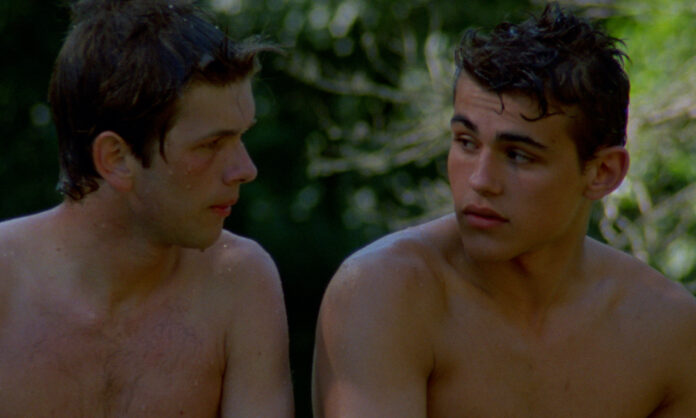Out gay filmmaker André Téchiné’s classic coming of age film, “Wild Reeds,” is being reissued on DVD and Blu-Ray March 28, and the film, made 30 years ago, remains an affecting drama.
The story depicts the resilience of four youths who grapple with their lives, war, and sexuality in 1962 France. François (Gaël Morel) is best friends with Maïté (Élodie Bouchez), but he does not love her in the way she wants or hopes. He is slowly coming to terms with his homosexuality — especially after having an erotic encounter with Serge (Stéphane Rideau), a handsome classmate. Serge befriends François because they are opposites. Whereas Serge, the son of sharecroppers, is earthy, and likes sports, François is an intellectual who does not run because he has a heart condition. They develop and easygoing friendship; François writes a paper for Serge, and Serge helps François with his math homework. (A scene of François reaching for notes Serge has tucked in his shorts is quite homoerotic.)
As François realizes he is gay — a powerful scene has him acknowledging his sexual identity in a bathroom mirror — he yearns to have another tryst with Serge. A shot of François hugging Serge on a moped captures the desire he feels but knows in his heart is one-sided.
Gaël Morel’s sensitive performance anchors “Wild Reeds” because most of the characters orbit around him. (The film is reportedly based on Téchiné’s life). François gains a sense of confidence after telling Maïte about his same-sex desires, and she is encouraging. “It changes nothing for me,” she tells him, despite feeling heartbroken. François is not ashamed of being gay — at least he claims that to Henri (Frédéric Gorny) another classmate, when Henri provokes François about his sexuality. In fact, François is curious about what he can expect in life as a young gay man in an era where homosexuality is not embraced. His anxiety about this even leads him to consult a gay shopkeeper for some guidance in a quietly powerful scene.
“Wild Reeds” takes its title from a fable in which a mighty oak falls because it cannot bend with a strong wind, whereas a reed adapts easily to the hazards it faces. This is an apt metaphor not just for François, but for the other main characters who experience growing pains as well. Serge is devastated when his older brother, Pierre (Eric Kreikenmayer), is killed fighting in the Algerian war, and becomes depressed. He tries to work out the direction of his life, working on the farm and getting married, as he does not expect to pass the baccalaureate.
Meanwhile, Maïte’s mother, Madame Alvarez (Michèle Moretti) — who is François, Serge, and Henri’s teacher — suffers tremendous guilt over Pierre’s death. He implored her to help him avoid service, but she turned him down. She leaves her job and takes a sleeping cure. After Monsieur Morelli (out actor/director Jacques Nolot) takes over the class, he tries to encourage Henri to apply himself more, but the young man, now 21, is of an age where he can decide his own future.
The shifting situations eventually focus less on François and more on Maïte. Early in the film, François hopes that Serge and Maïte might couple up — he directs her to attend to Serge during his brother’s funeral. But instead, she becomes interested in Henri, despite their opposing political ideologies. (Maïte is a communist, and Henri, who was born in Algeria, supports the OAS, a resistance organization.) Maïte and Henri meet one evening an eventually give in to their desires.
Téchiné’s leisurely-paced film is involving as these episodes unfold, and it never becomes soapy as the characters find their way. Even the most melodramatic moments, as when Madame Alverez has a breakdown in class, avoid overdoing the emotion. Téchiné has so fully immersed viewers into the lives of his characters, it is easy to feel for them.
Moreover, the director films the characters lovingly. As François watches Serge play sports — Téchiné’s camera, a stand-in for François, practically fetishizes Rideau’s body — and his longing is palpable. Likewise. a scene of the classmates frolicking in a river oozes sensuality while also showing the self-confidence each teen has developed. The film lets the characters grow organically, and the naturalist style and realism enhance the emotional investment.
“Wild Reeds” features strong period details, from a series of American pop songs on the soundtrack to the clothes and set design, the posters and more. Perhaps because it is a period piece the film does not feel dated despite being 30 years old.
The ensemble cast of relative newcomers make strong impressions here. Morel went on to direct several gay films, including “Full Speed,” “Three Dancing Slaves,” and “Our Paradise,” all of which featured Rideau, an actor possibly best known for the gay romantic drama, “Come Undone.”
At the time of its initial release, “Wild Reeds” collected four César awards (the French Oscar), for Best Film, Best Director, Best Screenplay, and Most Promising Actress for Bouchez. It is a beautiful, moving drama that deserves to seen — or reseen.
